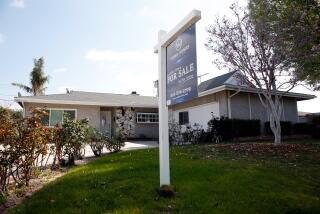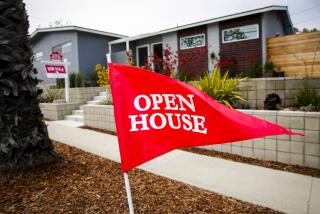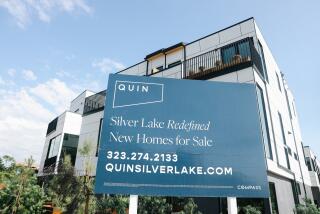Million-Dollar Home Sales Soar 25% in July Amid Stock Losses
- Share via
In July, as stock prices tumbled to their lowest level in five years, America’s wealthiest people went house hunting.
Sales of homes priced at more than $1 million rose 25% in July to 1,702 from a year earlier, as measured by research firm DataQuick Information Systems. The increase followed a 48% rise in million-dollar sales during the second quarter. The largest percentage gains in both periods were for homes with prices exceeding $10 million.
With the Standard & Poor’s 500 index headed for its third straight down year, more rich Americans are seeing real estate as a secure place to put their money, property brokers said. Housing is a key reason why the economy hasn’t slipped back into recession, according to economists.
“The stock market has been a foe to some, but it’s been a friend to real estate,” said John Burns, president of Burns Real Estate Consulting Inc. in Irvine. Wealthy Americans are “moving a greater part of their net worth into luxury housing,” he said.
By segment, sales of homes priced from $1 million to $5 million grew 48% to 5,400 in the second quarter, while sales of $5-million to $10-million homes rose 23% to 28, and sales more than $10 million more than doubled, to 19 from 6, according to DataQuick.
In Aspen, Colo., Robert Ritchie, a real estate broker with Coates, Reid & Waldron, said he sold a 12,000-square-foot home two weeks ago to a chief executive who took money out of the stock market. Ritchie wouldn’t name the CEO.
“All our buyers are saying that--’I’m putting my money into hard assets,’ ” Ritchie said. “These are the guys who really know what’s happening, the guys who run our economy.”
After dropping 10% in 2000 and 13% in 2001, the S&P; 500, the most widely followed benchmark for the U.S. stock market, is down a further 23% this year.
Home prices gained 7.4% in the second quarter from a year earlier and home re-sales are on pace to beat last year’s record 5.3 million, according to the National Assn. of Realtors.
“Housing has been the primary driver of economic activity, particularly over the last year,” said Richard Yamarone, senior economist with Argus Research Corp.
Gains in home prices amid the stock market decline have sparked concern of a housing “bubble.”
The rate at which home loans went into foreclosure rose to the highest level in almost half a century, to 0.40% of all mortgages, in the second quarter as job losses caused Americans to fall behind on payments, said the Mortgage Bankers Assn. of America.
“About a third of U.S. markets are overpriced,” Burns said. “That doesn’t mean that we have a bubble that’s going to crash next week.”
Boston certainly shows signs of being in a price bubble, he said. New York is “slightly overpriced,” as are San Francisco and San Jose, Burns said. Those arguing against a bubble point out that low mortgage rates have made buying a home more affordable, and that the larger homes being built may account for some of the price gains.
More to Read
Inside the business of entertainment
The Wide Shot brings you news, analysis and insights on everything from streaming wars to production — and what it all means for the future.
You may occasionally receive promotional content from the Los Angeles Times.










